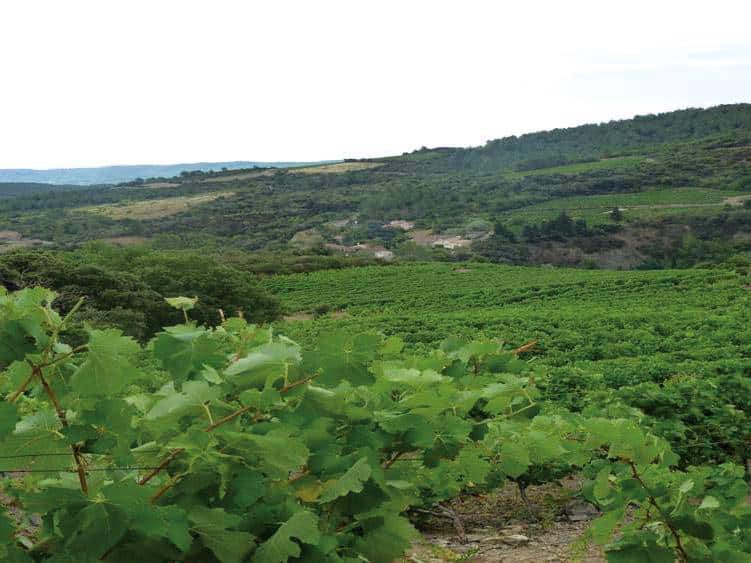Kent Barker | Country Matters
After taking a leap from London, the plan was to start a new life in the countryside and a career as a famous author. Instead I acquired a dog and part-time work managing a community orchard. You can read these experiences on my blog:www.kentcountrymatters.blogspot.co.uk
Myrtle and I had ventured up this dirt road which climbed steeply away from the valley floor. Traffic is extremely rare on these tracks that criss-cross the hills around the village, making walking on them with the dog a delight. However small the roads around me in Kent, there’s always the likelihood of traffic. In the hilly country of the Herault in southern France the chances of seeing a vehicle are remote. And if you do it’s likely to be a wine grower on the way to tend some sloping vineyard that somehow clings precariously to the side of the mountain.
But as we turned the corner a white van rattled down the road towards us, raising clouds of dust into the hot morning air. And no sooner had it passed than a pair of pick-ups in convoy came up from behind, forcing us to step into the woodland on the side of the road. The men driving looked preoccupied and 500 metres further on we discovered why. They had stopped, blocking the track, and were gathered in a huddle peering at the underside of a vehicle a little way down the slope. It took a minute to realise this wasn’t some abandoned rusting relic, but a relatively new tractor – on it’s side in the vineyard.
These special vehicles have extremely narrow wheelbases in order pass between the vines, and it must have overbalanced as it turned at the end of the row that it had been spraying.
It didn’t look as if anyone was hurt – except perhaps the pride of the driver – so we walked on, but it did make me realise just how tough it is growing grapes up in the hills around St Chinian – at least compared to the flat plains down towards Beziers and the sea. There they have room to manoeuvre those huge great mechanical pickers up and down the rows of vines, which are grown along a wire. Up round the village where I stay, just about everything has to be picked by hand.
At first glance it seems amazing that vines grow in this terrain at all. There’s no earth to speak of, just a covering of flinty rocks known as schist.
But actually grapes positively thrive on hard terrain (much of the Bordeaux wine is grown on sand, gravel and round, flat pebbles) forcing the plant to search for moisture and nourishment.
The problem is that in an age of mechanisation it’s much more expensive to do everything by hand. A century ago the horse or mule provided the muscle power in the vineyards of the Languedoc, and these animals were equally stable whether they were on the flat or on a hill.
As we saw, a tractor pulling a sprayer – or a plough or mower – is a different matter. And mechanical picking is vastly cheaper than doing it by hand. Added to which there’s an increasing labour shortage in villages like Berlou – one of the 20 that make up the St Chinian Appellation D’origine Controlee (AOC).
There’s little to keep young people here, and it’s a hard life being a vigneron so, with EU offering grants to cut overproduction a few years back a surprisingly large number of vineyards were grubbed up. For a while it even looked as if the village wine co-operative might go out of business.
Fortunately there’s been a revival of interest in Languedoc wines generally, and the more specialist St Chinian ones in particular. Quality has been improved and new independent domaines have started up.
The advantage for these independents is that they often produce secondary ‘vin de pays’, preferring not to be bound by the rigid AOC system that determines exactly which blend of grapes must be used, and almost always forbids single varietal wines. But not all the independents are thriving. One in the village closed its doors last year – though the two brothers who owned it have yet to remove the faded ‘ouvert’ or open sign from the front. We heard there’d been a rather public fraternal bust-up, with one wanting to keep going while the other was already grubbing up the vines on their joint parcel of land immediately in front of the village church.
It’s hard to assess the quality of two other independents in Berlou, their Caves never seemed to be open for tasting. But the third is definitely impressive. Decanter magazine described Domaine La Grange Léon as one ‘to keep an eye on’ with its emphasis on the ‘purity and expression of fruit’.
Unfortunately few St Chinian wines are really cheap – most sell locally for between six and ten euros a bottle.
The irony is you can often find the same wines in the big supermarkets in northern France for half that.








